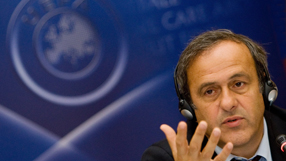FIFA should look to UEFA to avoid future farce
ZURICH - FIFA may have to look to their younger cousins on the other side of Switzerland to avoid a repetition of the controversy which surrounded the choosing of the hosts of the 2018 and 2022 World Cups.

The tumultuous process which culminated in FIFA opting for Russia and Qatar was a stark contrast to UEFA's low key campaign to choose the hosts for Euro 2016 - a 24-team tournament rivaling the World Cup for prestige - earlier this year.
FIFA's bidding process, in which the hosts are chosen by the 22 members of its executive committee, left the impression that political wheeling and dealing is more important that simply presenting a good bid.
Qatar, whose bid had been described as FIFA's own technical committee as posing a potential health risk to players and visitors, was awarded the 2022 World Cup.
Meanwhile, England's bid team were incredulous after picking up only two votes out of 22 for what they believed was the best bid for the 2018 World Cup, won by Russia.
There were no such complaints when UEFA, based in Nyon on the shores of Lake Geneva, chose France to host Euro 2016 in a campaign where the emphasis was almost exclusively on the technical quality of the bids.
Unlike FIFA, UEFA does not allow members from bidding countries to vote. It also has stricter guidelines on gifts to UEFA officials, which are clearly limited to a "symbolic" value of 150 Swiss francs.
Michel Platini, who is president of UEFA and also sits on the FIFA executive committee, recently pondered the possibility of extending the vote to the entire FIFA Congress.
Get FourFourTwo Newsletter
The best features, fun and footballing quizzes, straight to your inbox every week.
Platini estimated that being awarded the World Cup could benefit a country to the tune of between 10 and 20 billion dollars.
"You can imagine what kind of pressure a candidate could exert on a person who has a vote," he told Swiss newspaper Tages Anzeiger. "Maybe we can talk about that, what we can change in the way it is awarded.
"Maybe one possibility is that the whole Congress decides, that way the weight of an individual would not be same as it is today," he explained.
The FIFA election was characterised by the quite open lobbying of the 22 executive committee members.
England's bid chief executive Andy Anson made no bones at the start of the week about what was facing him.
"Obviously, the strength of the bid is important but when you've got 22 people with two campaigns who've got their own issues or agendas, or their own elections to worry about, of course politics are involved," he said.
TWO VOTES
Following their snub on Thursday, Anson's mood had turned to anger. "Whatever money that was spent on the technical bid was, that money went straight down the drain," he said.
Anson said that lobbying went on until five o'clock in the morning of the day of the vote and that, in his meetings with executive committee members, he had been assured of more votes than the two than they mustered.
"Having only 22 guys voting gives them too much power and influence," he said.
There was certainly no lack of technical detail for FIFA's executive committee to go on, if they had wanted.
